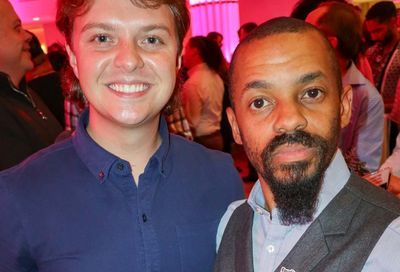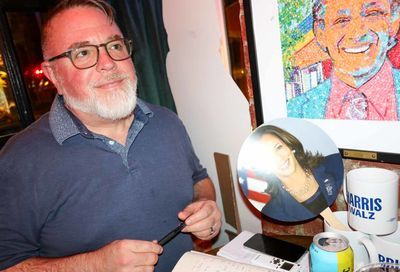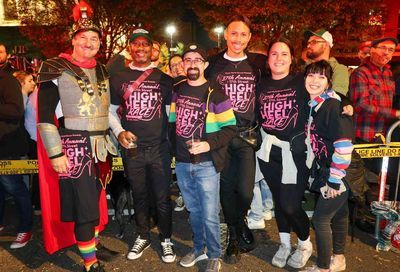Blind Ambition
Commentary: In Exile
I have this theory, and the theory is that people can be divided into two distinct groups: Those who are successful by the time they turn thirty-years-old, and those who are distinctly not.
To those who would argue that success is a subjective concept, I offer a condescending smirk. Tell a successful person that success is subjective and they’ll still be laughing a year after they’re successfully dead. In New York City, an overstocked aquarium filled with malnourished piranha, flecks of foam are forming at the corners of tightly pursed mouths. Egos are swelling like boils.
In my place of employment, there exists a hierarchy that makes the Indian caste system seem like affirmative action. And in my entry-level position, I am undeniably Krazy Glued to the bottom of this very strict structure. “Get a fact-checker to do it,” is a phrase often heard around the office, usually referring to an arduous task that is the white-collar equivalent of digging for coal in a creaky, pre-OSHA West Virginia mineshaft.
The office, however, is only an obvious microcosm for a sense of hierarchy that stops up the city like gridlock. Conversations with strangers degenerate into jockeying for position, two boxers circling each other in a ring, bouncing on their toes. “What do you do?” is the successful person’s left-hook, and the fact-checker takes it on the chin.
This summer has been like mood monsoon season, downpour after downpour of torrential moods. My life has become like the New York Post front page, every day a different 80-point bold-faced headline: HYSTERIA! under a photo of bad moods swarming down on crowds in the street like a sci-fi movie. ELATION! over a picture of a sweaty, smiling woman in a hospital bed hoisting septuplets, seven adorable, happy little moods.
The excellent travel novelist Geoff Dyer says one’s twenties are filled with manic ambition and one’s thirties are spent in disappointment for not attaining the heights of those ambitions. I feel manic. And moody. Moody in a way that I’ve never quite felt before, and I think it’s because I’m expecting more of myself. Or New York is. This city wants to see foam at your mouth and your ambition on your sleeve.
Sometimes I try to picture New York without the ambition. Just the bars and the parks and the flea markets. No hustling, bounding ahead or scrambling for crumbs of success and status plummeting from on high. I close my eyes tightly and picture it, and when I open them again, I look around and find that I’m in Seattle.
People are drinking decaffeinated vanilla chai tea with Mt. Rainier as a backdrop. They’re taking ninety-minute lunch breaks from their jobs as bicycle surgeons and lounging in lush, moist seaside dunes. Nearly every New Yorker I know, at times, talks about moving to Seattle. In our minds, it’s like some sort of mystic urban Shangri-La where everyone’s wholesome and happy and Zen. It’s a city, and yet it’s content. Seattle is like our older brother, living on organic granola bars, planting trees for the Bureau of Land Management and smoking too much pot. We feel superior to him, but we also feel a little bit envious.
It’s a choice to be made as early as possible: Do you want to be New York, or do you want to be Seattle? Do you want to work very hard, ascend the platinum ladder, or do you want to plant saplings and smoke lots and lots of marijuana? These kinds of questions take on a sense of urgency when you feel like you’re moving in one of these two directions by default, just caught up in the current of a randomly passing magnetic field.
When I first moved here nearly a year ago and was working many part-time odd jobs, one of these jobs was handing out fliers downtown for a city-run conglomerate called the Lower Manhattan Development Corporation. I would often hand them out down on Wall Street for $14 an hour, or outside the New York Stock Exchange, to people who make $1,400 a day, many of them younger than me.
Some of these Wall Street types are literally kids. Eighteen, nineteen-years-old. Most of them look a little pop-eyed as they hurry to work, as if they’re not quite sure exactly what they’ve gotten themselves into. I often felt a twinge of smugness out there, listening to my Walkman while I performed my zero-stress job as they worried (I was convinced) through every second of every working day about whatever.
Slackerdom can feel so romantic. It still tugs at me, even now, a year later, as I hustle to a more careerish job just like the Wall Street toddlers do, maybe not in a suit with a briefcase, but a job that sometimes wakes me in the middle of the night, worrying that I’m falling behind my peers, or just worrying that I’m not worrying enough.
In Broadcast News, Al Brooks’ character, a reporter, wonders if he’s slipping, and then further wonders if it’s only the successful people who worry that they’re slipping because their standards are so high. I think it’s somewhere between the two. Who wouldn’t want to ask someone, “What do you do?” and feel confident that the response won’t make them feel small. In a city where “what do you do?” is often used as a euphemism for “who are you?” it’s hard to ignore.
Will Doig writes biweekly from his ambitious New York exile. He can be reached at wdoig@metroweekly.com.
Support Metro Weekly’s Journalism
These are challenging times for news organizations. And yet it’s crucial we stay active and provide vital resources and information to both our local readers and the world. So won’t you please take a moment and consider supporting Metro Weekly with a membership? For as little as $5 a month, you can help ensure Metro Weekly magazine and MetroWeekly.com remain free, viable resources as we provide the best, most diverse, culturally-resonant LGBTQ coverage in both the D.C. region and around the world. Memberships come with exclusive perks and discounts, your own personal digital delivery of each week’s magazine (and an archive), access to our Member's Lounge when it launches this fall, and exclusive members-only items like Metro Weekly Membership Mugs and Tote Bags! Check out all our membership levels here and please join us today!






















